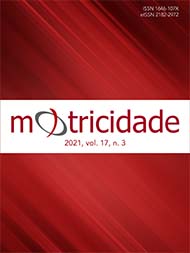The Expected Number of Olympic Medals: A Case Study of Team Portugal at Tokyo 2020
DOI:
https://doi.org/10.6063/motricidade.25488Keywords:
Olympic Games, Results predictionAbstract
The 2020 Summer Olympic Games reached to an end in Tokyo, Japan. Even though all the hiccups, constraints, and challenges imposed by the COVID-19 pandemic, the Games were successfully held in August 2021. For the first time in history, Team Portugal won four medals (one gold, one silver, and two bronzes). In 2018 the Portuguese Olympic Committee signed a contract with the Portuguese Institute of Sport and Youth (i.e., Portuguese government) listing the deliverables of the mission Tokyo 2020 against a funding scheme of 18.5 million euros (Contrato n.º 33-A/2018; Contrato -Programa de Desenvolvimento Desportivo n.º CP/1/DDF/2018). The document sets, among other goals and deliverables, that no less than two medals would be won at Tokyo 2020 (section IV.1. of the contract).
On the road to Tokyo, Portugal got more than two medallists at World Championships in several Olympic sports. Indeed, there were six to eight potential medallists at the 2020 Olympic Games (O Jogo, 2021). There is evidence that just one-third to one-fourth of the Olympic athletes are able to excel and outperform at the Olympic Games. In the sport of competitive swimming, just 29.82% of all male Olympians and 53.84% of the finalists at Rio 2016 improved their entry times (Barbosa, 2016a). On average, only 30% of the swimmers were able to improve their entry time at the 2012 and 2016 Olympic Games (Barbosa, 2016b). At Rio 2016, Team Portugal was expected to win two medals out of nine potential medallists, i.e., almost 25% of effectiveness (Garcia, 2016). Thus, one can wonder if the Portuguese Olympic Committee was sensible, assuming that two athletes would reach the podium spot out of six to eight potential medallists. Also, it begs the question if the four medals won were an outstanding achievement, deemed as a substantial improvement of the Portuguese sports system or, if alternatively, the Portuguese Olympic Committee underestimated the number of medals that the country could win.
Downloads
Published
Issue
Section
License
The authors of submitted manuscripts must transfer the full copyright to Journal Motricidade / Sílabas Didáticas Editions. Granting copyright permission allows the publication and dissemination of the article in printed or electronic formats, and copyrights start at the moment the manuscript is accepted for publication. It also allows Journal Motricidade to use and commercialise the article in terms of licensing, lending or selling its content to indexation/abstracts databases and other entities.
According to the terms of the Creative Commons licence, authors may reproduce a reasonable number of copies for personal or professional purposes, but without any economic gain. SHERPA/RoMEO allows authors to post a final digital copy (post-printing version) of the article on their websites or on their institutions' scientific repository.


